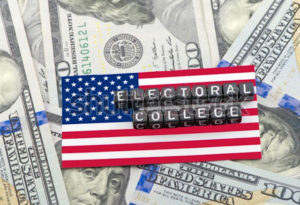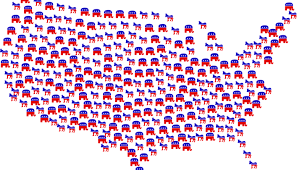Next stop, Supreme Court.
August 22, 2019The bias of white males is typically power and control. From this perspective nonviolence and love of enemies makes no sense whatsoever.
-Richard Rohr, Center for Action and Contemplation
A letter from Lawrence Lessig.
I’m writing to tell you about a critically important decision in a case of ours by the 10th Circuit Court of Appeals that could advance substantially our campaign to reform the Electoral College. At a minimum, it will get us a hearing in the United States Supreme Court, so that the fundamental question that our case raises can finally be resolved.
That question is this: Can presidential Electors within the Electoral College be forced to vote one way or another?
For most of my legal career (I won’t pretend to have thought much about the question before becoming a lawyer), I thought the answer to this question was easy: Of course they can! But in 2016, when Electors (and others) started raising the question, I began to look at the issue closely. To my surprise, I came to the view that the answer is actually no: That states cannot, constitutionally, control how their electors vote.
This conclusion is a bit terrifying: Can it really be that the choice for president could ultimately hang on the decision of a handful of electors? But terrifying or not, it seemed clearly to be what our Constitution prescribes. And after a record number of electors chose to vote their conscience in 2016, and not how they were pledged, we at EqualCitizens.US determined to get the question resolved finally before it creates a constitutional crisis.
Because remember: We know Electoral College contests are going to be closer in the future than they have been in the past; and as they get closer and closer, even a small number of electors could change the results of an election. Whether you think that’s a good system or not, we believe it is critical to resolve the question before it would decide an election. That means getting the Supreme Court to hear the case outside of a particular presidential contest, when they can answer the question without worrying about which candidate would benefit from their decision.
It now looks like that’s exactly what will happen. As I’ve written to you before, we’ve had two cases moving through the courts addressing this question — one in the Washington state courts, and one in federal court in Colorado. In Washington, three electors were fined $1,000 each for voting contrary to their pledge; in Colorado, one elector was removed, and two threatened for their decision to vote contrary to their pledge. We took the Washington case to the Washington Supreme Court and lost. Yesterday, we learned that we won in the 10th Circuit Court of Appeals. This conflict now pretty much guarantees that the question will be before the Supreme Court next year.
When I describe this case to people, their first response is usually something like this: Why would you ever try to get the Court to say that electors are free? The answer is that if indeed they are free, we should know that before the next election. If the Court decides as the 10th Circuit did, then that means that we as a nation need to decide whether we want to keep this system, or replace it — either through the National Popular Vote Compact, or through an Amendment to the Constitution. Or if the Court decides as the Washington Supreme Court has done, then at least we don’t need to worry about this instability within our presidential election system.
My bet is on the 10th Circuit. You can read its incredibly thoughtful opinion below. And when the Supreme Court affirms that result (in the Washington case — for technical reasons, that’s the case we’ll bring to the Supreme Court), then the race will be on to decide whether we keep the system the framers gave us, or decide as a nation — finally — to adopt something new.
Congratulations to my colleague, Jason Harrow, who argued the case before the 10th Circuit. And thank you to all the plaintiffs in both cases — Micheal Baca, Polly Baca, Robert Nemanich (Colorado) and Bret Chiafalo, Levi Guerra, Dove John (Washington) — who both did what they believed was the right thing to do in 2016, and have continued to fight in the almost four years since.
Stay tuned for the next episode. Meanwhile, we’re turning to the petition to ask the Supreme Court to take up this case for review.
Lessig
A Vindication For The Hamilton Electors
Jason Harrow, Equal Citizens Executive Director and Chief Counsel
What are the powers of individual presidential electors in the Electoral College? Believe it or not, through over two centuries of history across 58 presidential elections, most lawyers are still not sure, and the U.S. Supreme Court has not definitively weighed in. But, because of an amazing group of electors we’ve been representing and a remarkable decision released yesterday afternoon by the federal appeals court in Denver, that is very likely to change before the election of 2020. And whatever way the Supreme Court goes, it’ll be a good thing for our country that, at last, the Supreme Court will be forced to grapple with the constitutional role of presidential electors.
Back up a few steps. We all know that the president is not directly elected based on popular votes but is instead elected by the votes of members of the Electoral College. The members of this most unusual College are appointed by each state following the popular election, and electors are real people who cast individual votes that may — or may not — be for the presidential candidates that they are expected to vote for.
In the 2016 version of the Electoral College, there were more of these independent electors than there has ever been in the modern era: there were seven official anomalous electoral votes for president and six for vice president, and several more electors tried to cast such votes but were prevented by state officials. Each elector had his or her own reason for casting a vote for someone not named Trump or Clinton, but many presidential electors were no doubt responding either to evidence of electoral interference that may have ensured Donald Trump’s election or to the historically large mismatch between the popular vote and the predicted outcome of the electoral college.
The issue of whether those independent votes must be counted, or whether states may intervene and tell electors who to vote for, has been percolating in the courts since then. Yesterday, a federal appeals court, for the first time in history, definitively ruled that presidential electors have the constitutional right to vote for the candidate of their choice. That’s huge.
The case arose from the actions of three brave electors in Colorado — Micheal Baca, Polly Baca, and Robert Nemanich — who were threatened with removal if they failed to vote for Hillary Clinton, the winner of the popular vote in Colorado. Mike Baca was undeterred even by threats of serious punishment (including potential criminal perjury charges) and voted for John Kasich, in the faint hope that a few dozen Republican electors would join him and send the election to the House of Representatives, where a Republican other than Trump could be elected. His vote was never counted, though. Instead, after his vote was revealed, he was removed as an elector and replaced with another elector who voted for Clinton.
We filed suit to defend these electors in 2017. Yesterday, the federal appeals court in Denver agreed with our argument the Constitution protects his right to vote for president. It did so in a remarkable opinion that dug deeply into the constitutional text and historical practice — so deeply, in fact, that the opinion is 114 pages long. But there was a lot for the court to get to, and it’ll be a gripping read for those who appreciate careful judging and wise constitutional analysis.
We at Equal Citizens also represent a separate group of electors from Washington state, and in May, the Washington Supreme Court went the other way and said electors could be penalized for casting these faithless votes. Now that there is a direct split between these two appellate courts, it is very likely that the U.S. Supreme Court will accept one of the cases for review in the coming months and, at long last, definitively resolve the issue of the freedom of presidential electors.
Finally: A win is, of course, a win. But some may be wondering why we are still pursuing this case, long after the election of 2016 has been decided. If we really believe in democracy — and, at Equal Citizens, we really do — should we really be pushing for 538 presidential electors to have the constitutional discretion to take the presidential election into their own hands?
Of course chaos and unpredictability is not the end result what we want; instead, we want to make presidential elections better, not more random or uncertain. And this litigation is consistent with that mission, for several reasons.
First, the current situation of uncertainty among increasing numbers of faithless votes is simply untenable. There have been only 58 prior elections, but we’ve nonetheless had our fair share of oddball results. We have had elections decided by a single elector (1876); we’ve seen the Supreme Court halt a recount in a swing state (2000); we’ve had a tied election thrown to the House for decision (1800); and we’ve even had an entire state shift its vice-presidential votes to throw that race into the Senate (1836).
This just shows that crazy things happen more often than we might predict, and the current situation — where about 30 states have laws purporting to bind electoral college votes, but no one knows if they’re legal — could lead to the most destructive crisis of them all: a situation where there is disagreement over the validity of one or more key electoral votes. What if the election hangs in the balance and an elector votes one way but a state official says it’s invalid? That crisis just cannot happen; it could tear the country apart. We need to know in advance of the next election whether it’s legal to bind electoral votes.
Second, whether we like it or not, we don’t think the ultimate question is even close — which means that if it were litigated in the middle of a presidential election, it could change the outcome. If America doesn’t like this result — and even some of us don’t like this result — we should have a chance to avoid it before the next election. Those who wish to change the system — as we do, and as our clients do — should therefore want this question resolved now. If the Supreme Court agrees with us, it would give real momentum to real alternatives, whether a constitutional amendment or the National Popular Vote compact. . And even if we lose in the Supreme Court, that would make clear that states in the National Popular Vote Compact could legally bind their electors and ensure there are no dissents there. Either way, this case will provide an important improvement over the status quo.
Bottom-line: next stop, Supreme Court. Exciting times.
https://medium.com/equal-citizens/a-vindication-for-the-hamilton-electors-f114134da74d

